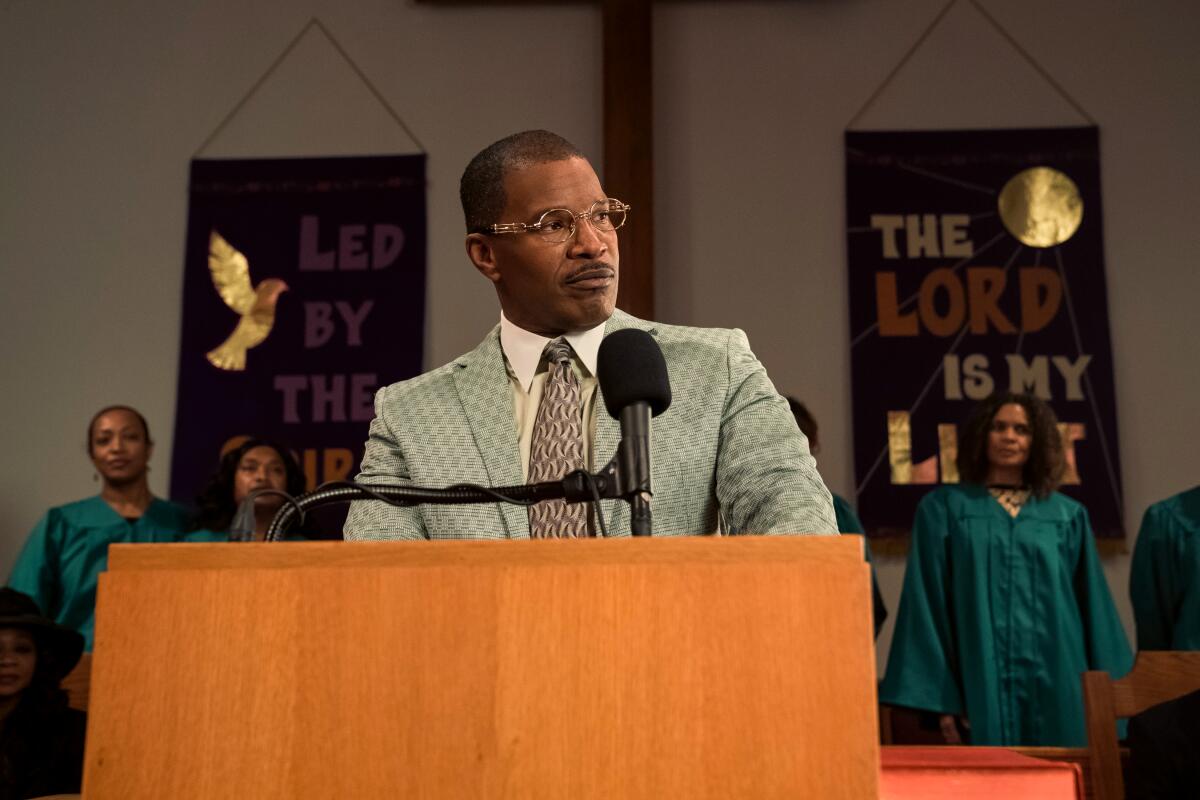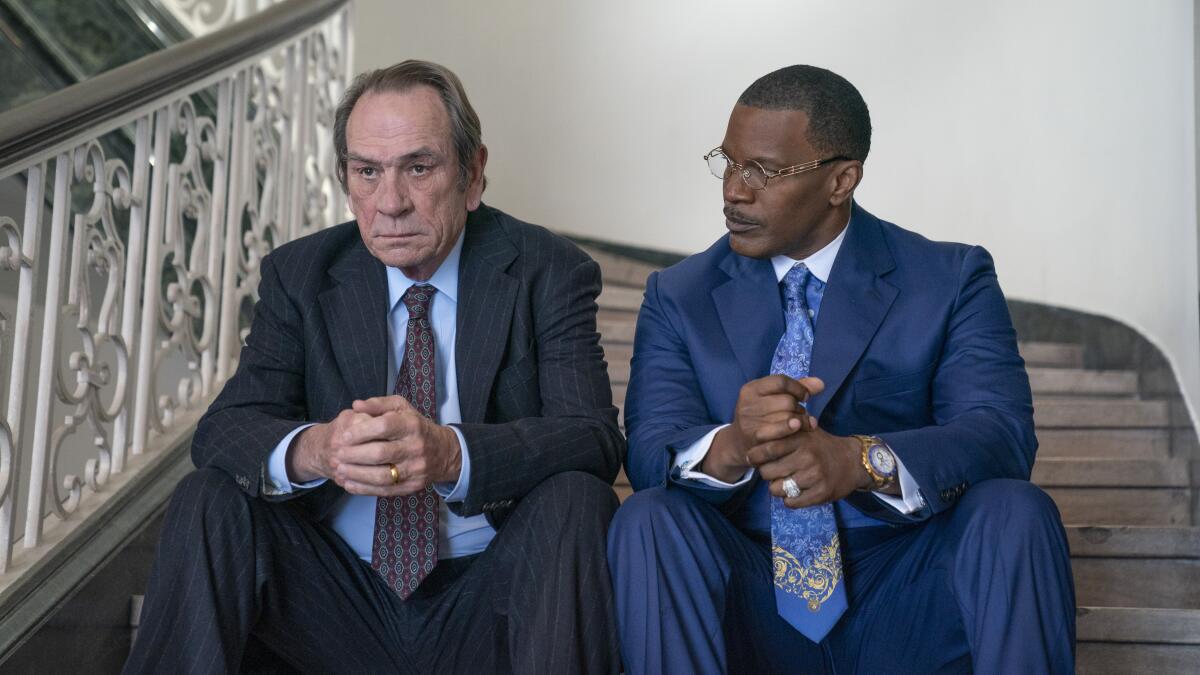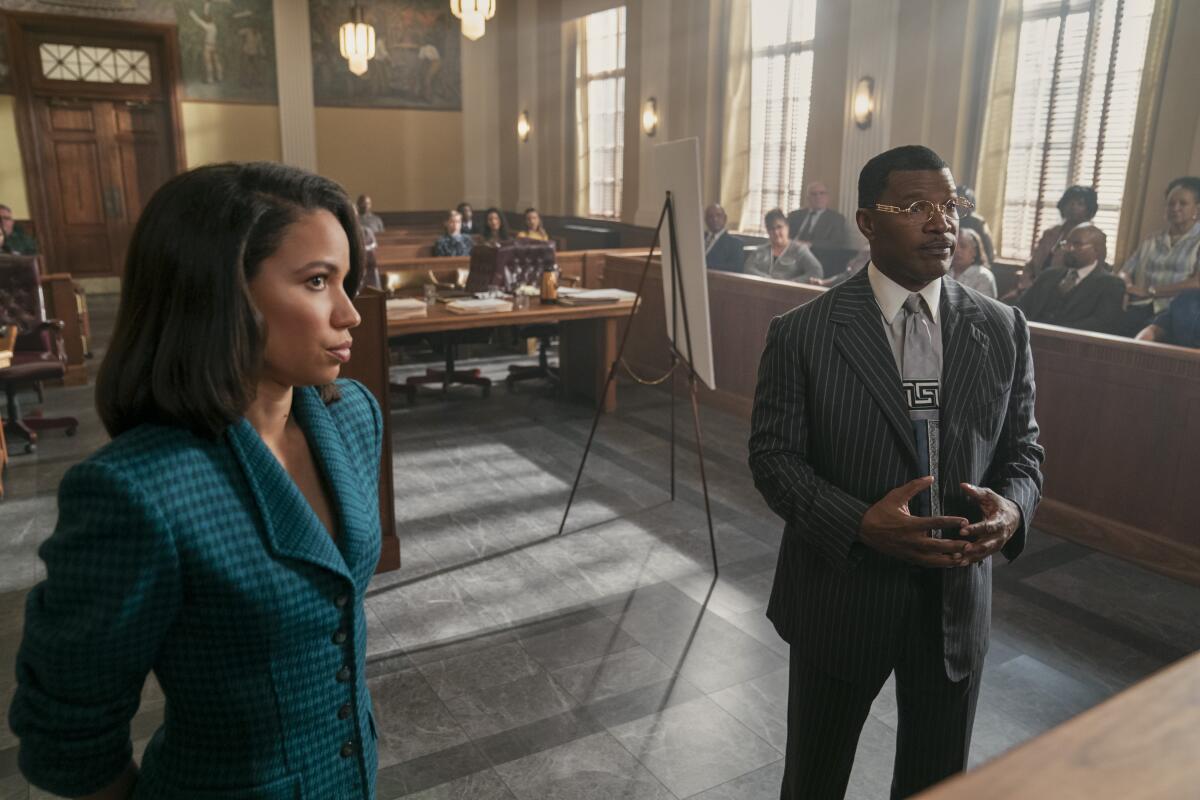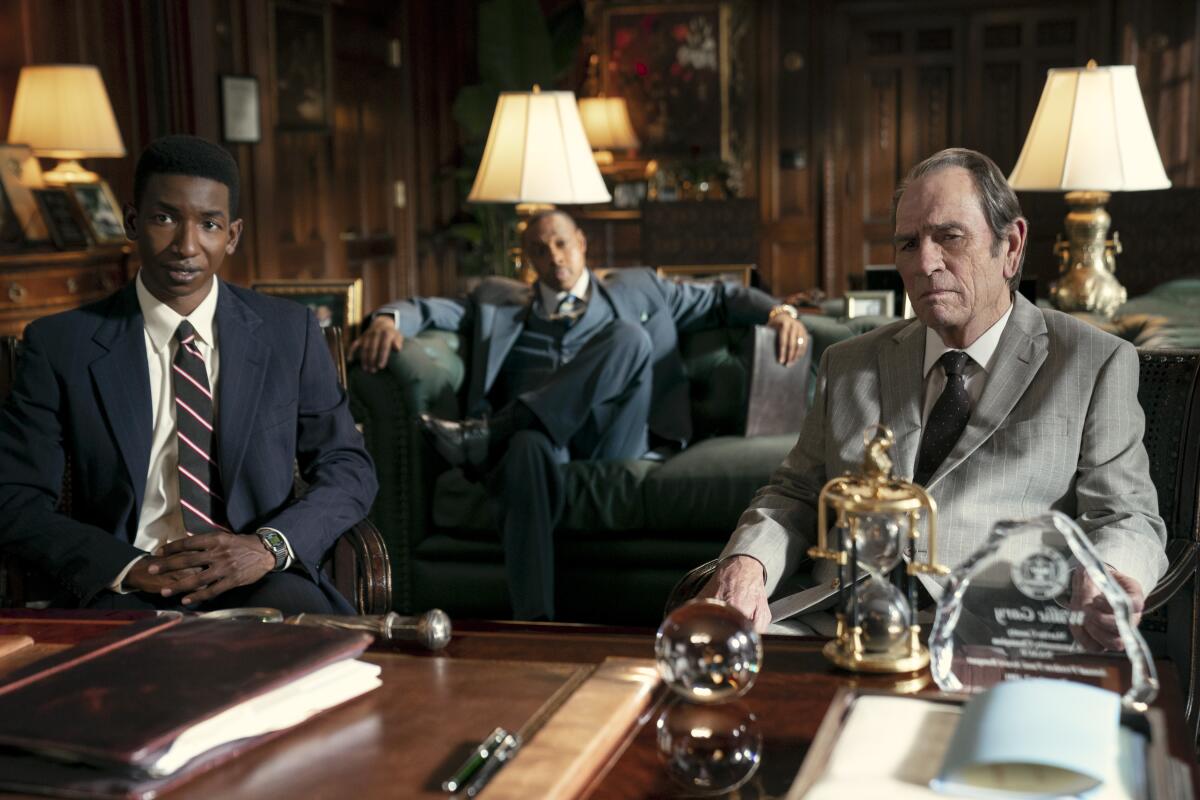Review: No objections to Jamie Foxx in the entertaining courtroom drama ‘The Burial’

With a fresh Supreme Court term and an ex-president’s fraud trial under way, it seems worth noting that we are living through an unexpectedly rich moment for courtroom dramas on-screen as well as off. Some of the strongest have made a virtue of ambiguity: “The Caine Mutiny Court-Martial,” now airing on Showtime, gives a fresh contemporary reading to a 70-year-old military melodrama, updating the setting but keeping its strict trial protocols and disquieting conclusions intact. This week also brings the unruly testimonies of “Anatomy of a Fall,” a knotty psychological thriller that, like last year’s rigorously nuanced “Saint Omer,” discovers procedural intrigue and moral uncertainty within the French legal system.
Those seeking more traditionally rousing courtroom entertainment will certainly find it in Maggie Betts’ bursting and big-hearted new movie, “The Burial.” Adapted by Betts and Doug Wright from a richly reported 1999 New Yorker piece by Jonathan Harr, it tells the story of Jeremiah “Jerry” O’Keefe (Tommy Lee Jones), a small-town Mississippi funeral-home owner who in 1995 sued the Canadian billionaire Ray Loewen (Bill Camp) over a contract dispute that swiftly snowballed into something more. At first glance, you couldn’t ask for a more obviously crowd-pleasing setup: an honest plaintiff and a hissable defendant, their pitched legal battle set to the creakily satisfying music of pounded gavels, overruled objections and full-throated lawyerly speechifying.
But Betts, whose first feature was the absorbing monastic drama “Novitiate,” has a gift for subverting and fulfilling expectations at once, and also for turning the strictures of traditional establishments inside out. Jerry and Ray may have been a veritable David and Goliath of the death-care industry, but this David’s lethal sling took the outsized form of Willie Gary, a flamboyant personal-injury attorney with little contract-law experience but an impressive track record of bodying the competition. And it’s Willie, played with extraordinary gusto and exquisite control by Jamie Foxx, who refuses to settle or compromise on his client’s behalf, in the process forcing all parties involved — the audience very much included — to see the enormous moral stakes and raw human interest in an ostensibly unremarkable case.

Foxx’s Willie is a controlled force of nature. It’s no coincidence that when we first see him, sporting a Rolex, gold-rimmed specs and a perfectly color-coded suit-and-tie ensemble, he’s standing up to speak in church, even if his proper sanctuary is a court of civil law. Like any religious huckster, though perhaps a shade more honest, Willie is a master of emotional manipulation and rhetorical force. He knows how to tell a story, how to build sympathy and draw out tension for maximum impact before going in for the kill. Locking eyes with a captive jury, he preaches a gospel of prosperity and punitive damages, insisting that they vindicate his aggrieved clients with multimillion-dollar payouts. More often than not, they do as they’re told.
“The Burial” leads with Willie from the start, establishing his reputation, his M.O. and his fabulously profligate Florida lifestyle, and making unmistakably clear whose story this is. Willie stays lodged in your memory even as the movie shifts to introduce Jerry, a good-hearted septuagenarian who, after a run of bad financial luck, has reluctantly agreed to sell off three of his mom-and-pop funeral homes to the Loewen Group. When Ray Loewen unexpectedly reneges on their handshake agreement, Jerry, facing financial ruin, opts to sue — not because he thinks he has much chance of winning, but because his sense of decency will allow nothing else. He isn’t about to let a predatory billionaire screw his children and grandchildren out of their inheritance, however modest it may be.
That desire to establish a meaningful legacy, and to fight the powers that threaten it, turns out to be an unexpected source of kinship between Jerry and Willie. As he reveals in a compact but stirring monologue, Willie faced no shortage of obstacles on his own early road to success, including the kind of racial discrimination that Jerry never had to deal with. But while Jones and Foxx have a predictably winning odd-couple rapport (their bonding over a classic R&B song sets up a beaut of a payoff), the movie happily has something more interesting in mind than an obvious comic clash of cultures and generations.

The Jerry-Willie alliance is set in motion by a younger attorney (an excellent Mamoudou Athie) who rightly observes that, with the case being tried in a majority-Black town, Willie might be just the secret weapon they need. If that sounds like a cynical ploy at first, an attempt to drag race into the spotlight, the movie’s persuasive rejoinder is that race is never irrelevant, especially where matters of corporate malfeasance, jury selection and the South are concerned. There is, for starters, the troublesome presence of Jerry’s own longtime counselor (Alan Ruck, “Succession”), whose undisguised bigotry is a clear liability even before he comes to verbal blows with Willie and his all-Black team. Soon, Willie also has to contend with Mame Downes (Jurnee Smollett), a hotshot Black attorney hired to defend the Loewen Group in a blatant fight-fire-with-fire move.
As they size each other up in court and after hours, Willie and Mame conduct both a ferocious battle of wits and a sly exchange of ideas — an exchange that, for all the actors’ natural chemistry, stops well short of flirtation, Willie being happily and faithfully married. (Amanda Warren flashes a mega-watt smile as his loving wife, Gloria.) His belief in the importance of family is another thing he shares with Jerry, who has his own supportive, salt-of-the-earth spouse (Pamela Reed). But the sharpest aspects of the story are those in which both plaintiff and defendant almost recede into the background, leaving their respective Black legal teams to duke it out — and to experience, at times, a kind of grudging camaraderie as they work on behalf of their white clients.

The racial dynamics at play are hardly incidental, and “The Burial,” suffice to say, turns out to be about much more than just a contract dispute. As the case progresses, an entire history of corporate racism, classism and predatory capitalism comes to light — a history that, for all its ’90s datedness (a chunky cellphone here, a cruddy VHS tape there), could hardly feel timelier or more topical. The investigation itself is gripping, if a little unwieldy; Betts’ panoramic approach to the story, while gratifyingly expansive, doesn’t always do justice to the finer points of the material. Mame, in particular, is a sharp enough character to make you want to hear more of her personal perspective on the proceedings, especially as her client becomes increasingly indefensible.
Even so, for a story whose every beat, every cross examination and every smoking gun lands more or less where you’d expect, “The Burial” is remarkable in the way it gradually excavates its central idea: the difficulty of Black solidarity and progress in a society that insists on exploiting Black pain for profit. That’s a dryly academic way of putting something that Willie, with his enviable oratorical powers, transforms into the stuff of excoriating comedy and high drama. Even the camera, which generally serves the story in as fluid and unshowy a way as possible, can’t help but be magnetized by the sheer dynamism of Foxx’s screen presence. His Willie doesn’t just vanquish the competition; he buries it.
'The Burial'
Rating: R, for language
Running time: 2 hours, 5 minutes
Playing: The Culver Theater, Culver City; Laemmle Monica Film Center, Santa Monica; starts streaming Oct. 13 on Amazon Prime Video
More to Read
Only good movies
Get the Indie Focus newsletter, Mark Olsen's weekly guide to the world of cinema.
You may occasionally receive promotional content from the Los Angeles Times.











